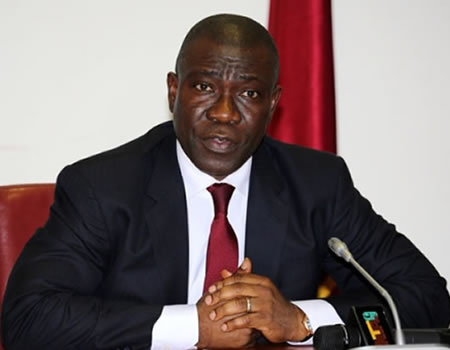Former Deputy Senate President and Senator representing Enugu West, Ike Ekweremadu has faulted the lockdown imposed by the federal government and certain states as precautionary measures to fight the COVID-19 pandemic.
Ekweremadu made the submission on Friday while fielding questions on “Political Voices”, a current affairs programme on Dream FM, Enugu.
Ekweremadu argued that provisions of the Nigerian Constitution specifically Section 305 was observed in the breach by the states and the Federal government which proclaimed lockdown.
Ekweremadu said: “I think the pandemic itself is an emergency situation that requires an emergency response. But some of the things we have done can only be accommodated under the Doctrine of Necessity because we have done things that are infringements to our own Constitution.
“Let me make myself clear, the response itself and actions taken by the Federal Government and the states have taken were absolutely necessary. But legally speaking, they failed the test of constitutionality because a lot of human rights contained in the Constitution have been infringed. That was why I said they could only be accommodated under the doctrine of necessity.
ALSO READ: Benue Vigilante Group Commandant lands in EFCC net over alleged N449.5 million fraud
“We have seen shutdowns. We have seen the closure of state borders. Those things are certainly not in tandem with a democratic society because if we weigh them strictly against the Constitution, nobody can be stopped from moving from one part of the country to the other. You cannot stop people from going to church or going to market.
“But the Constitution envisaged such situations and provided for them. If you go to Section 45, you would see that human rights could be legally abridged if there is a State of Emergency properly declared by the President. These are the provisions the Constitution has made to manage a situation like COVID-19, which we could have followed.
“So, I expected the President to take advantage of Section 305 of the Constitution, which deals with emergency powers or the State of Emergency. The President could have simply declared a ‘State of Emergency’ and send the gazette containing the emergency to the National Assembly. The National Assembly is enjoined to accept or reject it within fourteen days. But until that happens, the Proclamation takes effect.
“A Governor can also ask the President, through a resolution of the State House of Assembly, to declare a State of Emergency in a state or any part thereof.
“All said, this is not a time to be legalistic, but going forward we should know that if we make laws for ourselves, we need to obey the law.
“Overall, so far so good. The governments at the centre and in many of the states have done well in managing the pandemic”
Ekweremadu also picked holes with the controversial Control of Infections Disease Bill 2020 and the National Health Emergency Bill 2020, explaining that they negated the Constitution and could not possibly succeed as currently drafted.
“Let me use this opportunity to reassure Nigerians that the bill as presently presented will not be passed by the National Assembly. A lot of parliamentarians have lined up to oppose it.
“Parliament is essentially a market place of ideas. And like every other market, if you come to the market with a product that is not very good, you are not likely going to sell it. So, my colleagues in both chambers are entitled to presenting the Bills, but whether that will succeed or not is another kettle of fish.
“Looking at that Bill, which is intended to deal with dangerous or infectious diseases, it appears to me that the Bill is even more dangerous than the diseases they.
“If you look at some parts of the Bill, it says if you have any problem with the order or actions of the Nigeria Centre for Disease Control, NCDC, you have to appeal to the Minister and whatever the Minister says will be final. But Section 4 (8) of the Constitution says that no attempt should be made by the National Assembly or any State Assembly make nay law that ousts or purports to oust the jurisdiction of the court. In other words, you must right to go to court if you have any issues.
“So, to that extent, that Bill is null and void, unacceptable, and unconstitutional.”
He also cited infringements on democratic freedoms, such as freedom of association, freedom of movement, freedom to own properties, among others.
“To that extent, the Bill is unconstitutional because it gives the agency the right to breach those rights take over people’s properties, prevent from moving around, other infringements on rights and the Constitution provides that if any law is inconsistent with the provisions of the Constitution, that law is null and void to the extent of those inconsistencies.
“As I said, my colleagues have the right to present the Bill, but I can assure Nigerians that that Bill will not be passed as it is presently.”
WATCH TOP VIDEOS FROM NIGERIAN TRIBUNE TV
- Let’s Talk About SELF-AWARENESS
- Is Your Confidence Mistaken for Pride? Let’s talk about it
- Is Etiquette About Perfection…Or Just Not Being Rude?
- Top Psychologist Reveal 3 Signs You’re Struggling With Imposter Syndrome
- Do You Pick Up Work-Related Calls at Midnight or Never? Let’s Talk About Boundaries






